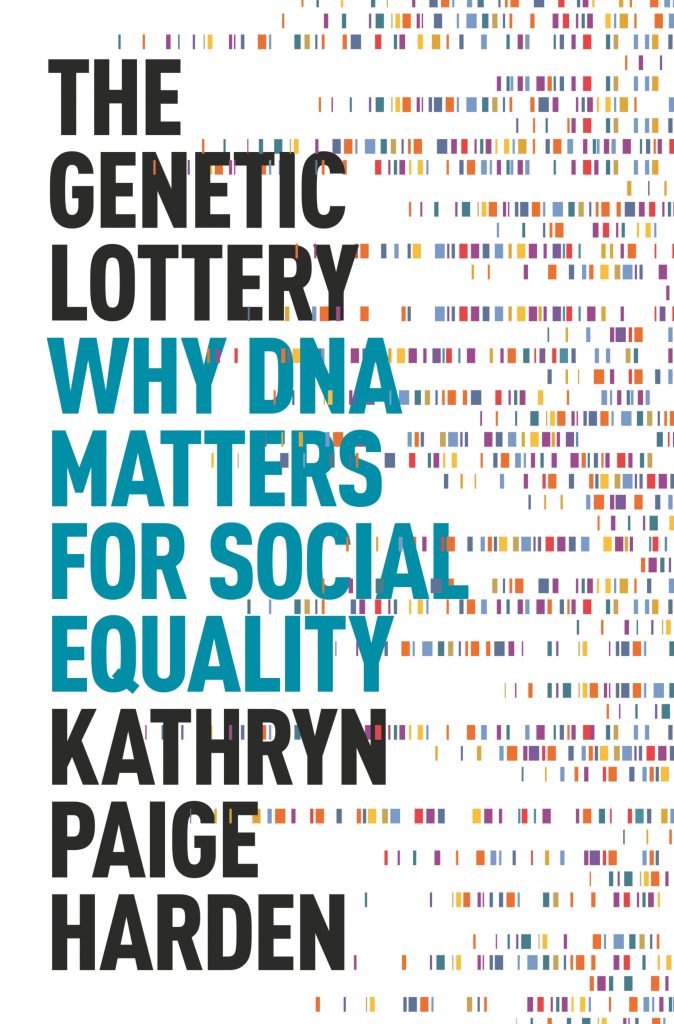In her book, The Genetic Lottery: Why DNA Matters for Social Equality, psychology professor Kathryn Paige Harden explores how genes contribute to variation in complex life outcomes such as educational attainment and income level. She argues that understanding genetic impacts on these outcomes could and should be used to promote greater equity among individuals with varying genetic predispositions. Harden takes pains to explain why the method her lab employs—genome-wide association study (GWAS), which looks at patterns across the entire genome rather than focusing on single genes—is useful only in examining differences between individuals within a particular genetic group and not for explaining racialized inequalities. Nonetheless, the book has drawn criticism from those who say that such research will be used by biological determinists as a weapon to justify and maintain existing social inequalities.
Your book covers both scientific concepts and philosophical ones. What were the challenges of presenting these two very different kinds of material to readers?
Going into the book, I imagined that the scientific material would be less challenging than the philosophical material, because I know the science much better. After all, I’m a scientist by training, not a philosopher. But, in some ways, the scientific material was more difficult to translate to a general audience. When you’re immersed in a topic, it’s harder to see what is important versus what is ancillary; what is intuitive versus what is difficult to grasp as an outsider. As a scientist, too, I also was much more aware that how my peers in the scientific community would evaluate the work: If I omitted a methodological detail for the sake of making the text more readable to a non-specialist, how would that omission be judged by my colleagues? That delicate balance between scholarly precision and readability was much more salient to me on the science side, whereas with the philosophy, I could take the approach of, “I’m a novice but here’s what I’m learning; come along with me.”
You explain how complex traits such as educational attainment result from tiny but cumulative effects from many genes. If each gene related to educational outcomes was a single number on the metaphoric lottery ticket, roughly how many digits would that lottery ticket be?
It would be many digits long: there are thousands of genes that are associated with educational attainment. But their effects differ from a lottery ticket in one key respect. For a lottery ticket, there is one combination that is a “winner,” and every other combination is a “loser.” For educational attainment, and other complex traits, the effects of different genes are additive: having 202 of the relevant genetic variants is associated with slightly more education than having 201, which is associated with slightly more education than having 200. It’s like a lottery ticket with 10,000 digits, where for each “winning” digit you stayed in school for one more day.
Genetic effects on individual differences in educational attainment is obviously a fraught topic due society’s history of using science to justify racist, sexist, and classist beliefs. Some advocate that we should abandon such research entirely to avoid the risk of results being misused to further discriminatory agendas. Can you discuss the dangers of not doing genetic research in this area?
Genetics is a technology that can be used for good or for evil. Like any technology, whether we are talking about cars or the internet or the ability to measure someone’s DNA, we always have to mitigate risks in order to maximize benefits. Currently, we as a society face some difficult scientific problems that nearly everyone thinks are important, such as: How do we improve educational programs so that children from low-income families can read as well as children from wealthy families? How do we design drugs to combat medical conditions like heart disease and diabetes? Genetics is a tool to help us understand why people differ from each other—psychologically and physically—and how, when we understand why people differ, we can better intervene to improve people’s lives. Not using the tools of genetics makes science slower and worse.
How confident are you and others in your field that GWAS will eventually yield insights with real-world applications, especially given that the candidate gene approach that preceded it also seemed very promising at the time?
The candidate gene literature was beset by a very different set of problems than the GWAS literature, namely, that none of the associations “discovered” by candidate gene studies were real. One commentator compared it to building “whole imaginary edifices, whole castles in the air…This isn’t just an explorer coming back from the Orient and claiming there are unicorns there. It’s the explorer describing the life cycle of unicorns, what unicorns eat, all the different subspecies of unicorn, which cuts of unicorn meat are tastiest, and a blow-by-blow account of a wrestling match between unicorns and Bigfoot.” Many of the methodological practices that are standard in GWAS (e.g., pre-registering analytic plans, requiring replication in an independent sample, strict controls for multiple testing) are a direct outgrowth of investigators being, quite frankly, appalled at the scientific practices that were de rigueur among candidate gene investigators. The challenges to “real world” applicability of GWAS findings are not the genetic associations discovered by GWAS are illusory; it’s that the associations have limited portability and unknown mechanisms. I would say that I’m cautiously optimistic: there are real challenges and also real opportunities.
You note that genetic effects become more pronounced as children grow up due to different social treatment they receive as a result of these initial variations, which leaves a lot of room for interventions to promote greater equity. How early should such interventions be made in order to provide the most benefit? And what kind of interventions would be needed?
Generally, the lesson of developmental psychology is that earlier and more sustained interventions are better than later and less intensive ones. But even some “light-touch” interventions delivered later in childhood and adolescence can be very effective at improving kids’ educational outcomes, if they are delivered at the right time and in the right contexts. We are just now bringing together the tools of genetics and the tools of randomized controlled trial tests of interventions. It will be really exciting to see in the next five years what new information comes out of that integration of methodologies.
Is there a risk that identifying children who are likely to struggle academically due to something that we view as immutable – their genes – will result in a self-fulfilling prophesy where both children and their caregivers/instructors subconsciously resign themselves to poorer outcomes even as they are trying to make positive interventions?
It’s important to remember that children are given information about themselves constantly in a school setting. Any piece of personal information that is returned to someone has the potential to be stigmatizing and discouraging, whether that information is “genetic” or not. There is the same danger when we give a child a diagnosis of learning disability or give them feedback on their academic performance in the form of test scores or grades. The challenge, then, is communicating that, even if your DNA sequence is immutable, the effects of your DNA on your life is not. As scientists, we have intuitive hunches about how to frame genetic information, but, ultimately, I think we need to be studying this scientifically: What framing of genetic information reduces stigma and conveys the possibility of change?
Society seems to have some understanding that genes impact life outcomes because we describe certain individuals as being “gifted.” And yet we don’t categorize such “gifts” as advantages the way we do with environmental factors like wealth. Why is one kind of advantage harder to acknowledge than the other?
That’s such an interesting question. Part of this schism in how we think about “gifts” has to do with how we construct our identities: I can envision a “me,” a self that is recognizably myself, that was born to different, very wealthy parents instead of my middle-class parents, but it’s harder to envision a “me” that has different talents and interests and personality traits. The other part, I think, is how we have moralized certain types of skills and talents as meritorious. Good students have been made out to be good people, for example.
Do you think we will ever be able to disentangle science from our politics and personal interests?
I think that depends on what you mean by “science.” The ideal of science, of course, is to make observations about the world in a systematic way that get us closer to understanding an objective reality that exists separate from the subjectivity of our personal interests. But scientists are people. I don’t think there is any way for a person to not be influenced by their own personal subjectivities, even if it’s in the choice of topics that they study scientifically.
The concept of “luck” comes up a lot in your book in addressing circumstances over which we have no control, both genetic and environmental. In addition to outcomes like educational success, might these factors also influence personality traits that we associate with being fundamentally good or bad people? Are people who are selfish or cruel also just unlucky?
That is the topic of my next book! We know genetics influences personality traits, including ones like callousness and psychopathy. We also hold people morally responsible, even when it was difficult for them to act otherwise, and the idea of “just desserts” is core to our legal system and our interpersonal relationships. My next book will explore these tensions, drawing not just on human genetics but also research on animal behavior more generally. I just started writing it, so ask me this question again in 2024 when I’ve finished it.
What has your experience been like promoting a book on what is, for some, a controversial topic? Is it true that there is no bad publicity?
For me, there is definitely such a thing as bad publicity! As an academic, I am used to sharp criticism; all professors are. But academic criticism has certain rules of engagement: I will tell a colleague that I think their inference is weak or that their evidence is insufficient, but I won’t comment on their body or claim that it’s evil for them to be interested in their topic. A forum like Twitter doesn’t follow those rules. These days, I try to cultivate some distance from some of the more impassioned reactions, and instead focus on appreciating the opportunities that the book has opened up for me. I love to talk to people about science; I love being able to connect people who have a common interest in the topic. And I try (and mostly fail) to stay off social media.

